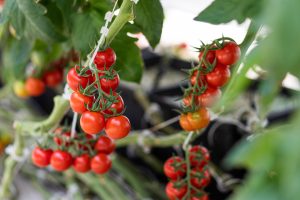Citizen scientists help researchers collect valid data. But University of Florida scientists wanted to know how citizen-science projects change the volunteers.
In a newly published study, a project involving urban gardening led participants to adopt healthier lifestyles.
For the study, Catherine Campbell, a UF/IFAS assistant professor of family, youth, and community sciences, worked with a team of researchers that tested 180 residents with different levels of gardening experience in Alachua, Orange and Broward counties to see how well they could grow a new variety of compact tomato in pots at home.

Participants grew tomato plants in three formats – one from seed, one small plant that they had to transplant, and one flowering plant. Researchers were interested in which format yielded the most fruit and which one participants liked the most, in terms of taste and the amount of effort it took to grow the fruit.
Daniela Perez Lugones, a doctoral student in plant medicine at UF/IFAS and a co-author on this study, published previous research on citizen science and gardening last year.
“The goal was to collect data in contexts that researchers normally do not have access — in people’s homes — from different audiences and growing conditions around the state,” Campbell said. “This study gave researchers a window into participants’ at-home experiences and struggles with different kinds of pests and climatic conditions.”
Nonetheless, they grew tomatoes, some more successfully than others. More importantly, their attitudes about urban home gardening changed.
After these volunteers participated as citizen scientists, they started looking at things in a more scientific way, Campbell said. She cited several examples.
- They wanted to research a tree in their yard to see what variety of fruit it was.
- Participants also used more scientific approaches in gardening — like recording data on watering/fertilization practices and their outcomes.
- They also do their own research or share scientific information with others.
“Essentially, our project looked at the citizen-science method as a jointly beneficial enterprise, where the plant scientists are learning about what home gardeners like, and the participants gain skills and knowledge that will help them be healthier by growing their own produce and eating more fruits and vegetables,” Campbell said.
Research has shown that home gardeners are more likely to eat the recommended servings of fruits and vegetables than people who don’t garden. It also shows that people who live in a house with a gardener (but who do not themselves garden) are three times more likely to eat the recommended servings of fruits and vegetables.
Also participating on the research was Celina Gomez, now an associate professor at Purdue University.
###
ABOUT UF/IFAS
The mission of the University of Florida Institute of Food and Agricultural Sciences (UF/IFAS) is to develop knowledge relevant to agricultural, human and natural resources and to make that knowledge available to sustain and enhance the quality of human life. With more than a dozen research facilities, 67 county Extension offices, and award-winning students and faculty in the UF College of Agricultural and Life Sciences, UF/IFAS brings science-based solutions to the state’s agricultural and natural resources industries, and all Florida residents.
 6
6
